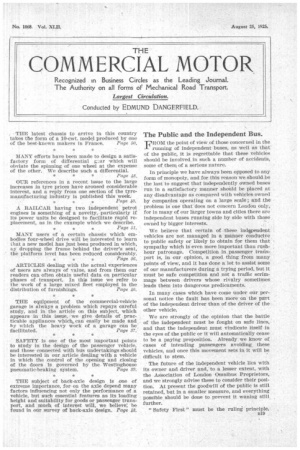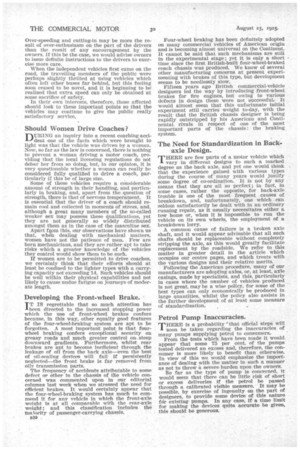The Public and the Independent Bus.
Page 1

Page 2

If you've noticed an error in this article please click here to report it so we can fix it.
T1ROM the point of view of those concerned in the running of independent buses, as well as that of the public, it is regrettable that these vehicles should be involved_ in such a number of accidents, some of them of a serious nature.
In principle we have always been opposed to any form of monopoly, and for this reason we should be the last to suggest that independently owned buses run in a satisfactory manner should be placed at any disadvantage as compared with vehicles owned by companies operating on a large scale; and the problem is one that does not concern London only, for in many of our larger towns and cities there are independent buses running side by side with those owned by bigger interests.
We believe that certain of these indpendent vehicles are not managed in a manner conducive to public safety or likely to obtain for them that sympathy which is even more important than rushhour patronage. Competition in passenger trailsport is, in our opinion, a good thing from many points of view, and it has done a lot to assist some of our manufacturers during a trying period, but it must be safe competition and not a traffic scrimmage between drivers whose rivalry sometimes leads them into dangerous predicaments.
In many cases which have come under our personal notice the fault has been more on the part of the independent driver than of. the driver of the other vehicle.
We are strongly of the opinion that the battle of the independent must be fought on safe lines, and that the independent must vindicate itself in the eyes of the public or it will automatically cease to be a paying proposition. Already we know of eases of intending passengers avoiding these vehicles, and once this movement sets in it will be difficult to stem.
The future of the independent vehicle lies with its owner and driver and, to a lesser extent, with the Association of London Omnibus Proprietors, and we strongly advise these to consider their position. At present the goodwill of the public is still retained, but in a smaller measure, and everything possible should be done to prevent it waning still further, "Safety First" must be the ruling principle. Over-speeding and cutting-in may be more the result of over-enthusiasm on the part of the drivers than the result of any encouragement by the owners. If this be the case, we would advise owners to issue definite instructions to the drivers to exercise more care.
When the independent vehicles first came on the road, the travelling members of the public were perhaps slightly thrilled at using vehicles which often left other buses far behind, but this feeling soon ceased to be novel, and it is beginning to be realized that extra speed can only be obtained at some sacrifice of safety. In their own interests, therefore, those affected should look to these important points so that the vehicles may continue to give the public really satisfactory service.




























